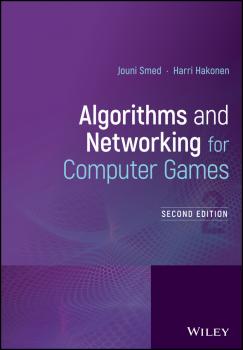Jouni Smed
Список книг автора Jouni SmedAlgorithms and Networking for Computer Games
Algorithms and Networking for Computer Games is an essential guide to solving the algorithmic and networking problems of modern commercial computer games, written from the perspective of a computer scientist. Combining algorithmic knowledge and game-related problems, the authors discuss all the common difficulties encountered in game programming. The first part of the book tackles algorithmic problems by presenting how they can be solved practically. As well as «classical» topics such as random numbers, tournaments and game trees, the authors focus on how to find a path in, create the terrain of, and make decisions in the game world. Part two introduces networking related problems in computer games and focuses on three key questions: how to hide the inherent communication delay, how to utilize limited network resources, and how to cope with cheating. Algorithms and Networking for Computer Games provides a comprehensive resource that offers deeper algorithmic insight into game programming and explains game-specific network considerations. Read on for… Algorithmic solutions in pseudo code format, which not only emphasizes the idea behind the solution, but also can easily be written into the programming language of your choice. A section on the Synthetic player, covering decision-making, influence maps, finite-state machines, flocking, fuzzy sets and probabilistic reasoning. In-depth treatment of network communication including dead reckoning, local perception filters and cheating prevention. 51 ready-to-use algorithms and 178 illustrative exercises. Algorithms and Networking for Computer Games is a must-read text for advanced undergraduate and graduate students on computer game-related courses, postgraduate researchers in game-related topics, and game developers interested in new approaches and the theoretical background to games.
Algorithms and Networking for Computer Games
The essential guide to solving algorithmic and networking problems in commercial computer games, revised and extended Algorithms and Networking for Computer Games, Second Edition is written from the perspective of the computer scientist. Combining algorithmic knowledge and game-related problems, it explores the most common problems encountered in game programing. The first part of the book presents practical algorithms for solving “classical” topics, such as random numbers, procedural generation, tournaments, group formations and game trees. The authors also focus on how to find a path in, create the terrain of, and make decisions in the game world. The second part introduces networking related problems in computer games, focusing on four key questions: how to hide the inherent communication delay, how to best exploit limited network resources, how to cope with cheating and how to measure the on-line game data. Thoroughly revised, updated, and expanded to reflect the many constituent changes occurring in the commercial gaming industry since the original, this Second Edition, like the first, is a timely, comprehensive resource offering deeper algorithmic insight and more extensive coverage of game-specific networking problems than ordinarily encountered in game development books. Algorithms and Networking for Computer Games, Second Edition: Provides algorithmic solutions in pseudo-code format, which emphasises the idea behind the solution, and can easily be written into a programming language of choice Features a section on the Synthetic player, covering decision-making, influence maps, finite-state machines, flocking, fuzzy sets, and probabilistic reasoning and noise generation Contains in-depth treatment of network communication, including dead-reckoning, local perception filters, cheating prevention and on-line metrics Now includes 73 ready-to-use algorithms and 247 illustrative exercises Algorithms and Networking for Computer Games, Second Edition is a must-have resource for advanced undergraduate and graduate students taking computer game related courses, postgraduate researchers in game-related topics, and developers interested in deepening their knowledge of the theoretical underpinnings of computer games and in learning new approaches to game design and programming.

